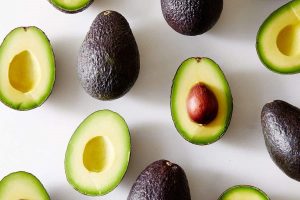Why Avocados Should Be Part of Your Diet
 Avocados originally came from Mexico and Central America, but now avocados are grown and enjoyed all around the world. The average yearly consumption of avocados per capita in the US has gone from around 1.1 pounds of avocado per capita per year in 1989 to just over 7 pounds of avocado per capita per year in 2016 (source). The love of avocados continues to grow as we are finding more ways to add the buttery avocado to sweet and savory dishes.
Avocados originally came from Mexico and Central America, but now avocados are grown and enjoyed all around the world. The average yearly consumption of avocados per capita in the US has gone from around 1.1 pounds of avocado per capita per year in 1989 to just over 7 pounds of avocado per capita per year in 2016 (source). The love of avocados continues to grow as we are finding more ways to add the buttery avocado to sweet and savory dishes.
Is this increase of avocado love just a fad or is there nutritional merit for eating more avocados?
Eating avocados as part of a healthy balanced diet can provide many nutritional benefits including: being heart healthy, not increasing risk for weight gain, providing antioxidants, fiber and being a source of almost 20 vitamins and minerals.
Yes avocados are high in fat, but the fat is mainly heart healthy monounsaturated fats. While adding avocado onto everything doesn’t translate into making a diet healthy, switching it for other fat sources can have nutritional benefit.
Avocado is a nutrition power house
Contrary to what many people believe, avocado is a fruit and not a vegetable. A serving is usually defined as 50 grams or about 1/3 of a medium avocado. Here are the nutrients provided from a serving of an avocado and why it could be considered a nutrition power house.
- Blood pressure nutrients. A serving of avocado provides 250mg of potassium (6%DV) and 15mg (4% DV) of magnesium. By providing potassium and magnesium, avocados provide nutrients that promote healthy blood pressure levels, muscle contractions and nerve functioning.
- Antioxidants. A serving of avocados provides 4 mg of vitamin C (4% DV), 1 mg of vitamin E (6% DV) and a source of the antioxidant lutein. In fact, the amount of lutein from avocados is the one of the highest fruit sources. Vitamin C and E are antioxidants that protect cells from damage, and lutein is an antioxidant associated with protecting against cataracts and age related macular degeneration.
- B vitamins. A serving of avocado provides thiamin (B1), Riboflavin (B2), Niacin (B3), vitamin B6, folate and pantothenic acid. B vitamins are needed to make new red blood cells and break down nutrients for energy.
- Mineral source. Besides potassium and magnesium, avocados provide about 2% DV of iron, phosphorus, zinc, 4% DV manganese and 10% DV copper.
- Fiber. A serving of avocado provides 3 grams of fiber (11% DV). Eating more avocados in place of other fats can by a simple way to increase fiber intake. Fiber can help increase satiety after eating, move food along the digestive tract and can help lower blood cholesterol.
Low in sugar and high in heart healthy fats
Unlike other fruits, avocado is naturally low in carbohydrate and sugar. A serving only provides 4 grams of carbohydrate and 3 grams of fiber. Therefore, avocados are low in glycemic load.
They are also a good source of heart healthy monounsaturated fats; a serving provides 8 grams of total fat with 5 grams coming from monounsaturated fat.
Avocado and heart health
Avocados can be beneficial for heart health because they provide nutrients that support healthy blood pressure, provide fiber than can help lower cholesterol and provide heart healthy fats.
A 2018 review of studies with avocado and heart health found avocado intake was associated with increased HDL cholesterol. Having high HDL cholesterol is associated with a lowered risk for heart disease.
A 2015 study concluded eating an avocado per day as part of a heart healthy diet can lower oxidized LDL cholesterol and increase plasma concentrations of the antioxidant lutein. Oxidized LDL is considered pro-inflammatory and can increase damage to blood vessels that may promote cardiovascular disease.
A 2015 review suggests avocado may help improve blood pressure levels due to the potassium and lutein content by controlling oxidative stress and inflammation.
Avocados and weight loss
Since avocados are high in fat and calories, will eating them increase risk for weight gain?
Research results suggest eating avocado as part of a balanced diet won’t increase risk for weight gain and can be part of a weight loss diet.
Like nuts, which are also high in fat, eating avocados in moderation isn’t associated with increased risk for weight gain.
Substituting avocados in place of other fat sources is recommended instead of adding avocado without cutting back on other fat sources.
A 2005 study had study participants on one of either isocaloric diets: one that included 200 grams of avocado (30 grams of fat) in place of other fats or a diet that provided the same amount of fat from other fat sources. At the end of 6 weeks researchers found at the end of 6 weeks both groups lost weight and there was no difference between the groups.
How to get more avocados in your diet
Swapping in more avocados into your diet can be easy. Avocado (or guacamole) can be used as a replacement for:
- Mayo, butter or other cream based spreads for sandwiches or toast
- Bacon or cheese on salads
- Butter or oils when baking
- Sour cream or a baked potato
- Dip for chips, crackers or veggies
Incorporating more avocados into your diet is considered a safe, healthy step for most people. However, if you have latex allergy, use caution and speak with your doctor before eating avocado.
If you are on a renal diet, speak with your health care team before adding avocados to your diet.
Guacamole and the Frozen Avocado
Guacamole is always a welcome addition to the menu for my family and friends. It is so easy to make and you can tweak the flavors to suit your own taste. The hardest part of making guacamole is timing the avocados to be ripe when you need them. I have been in the position of being at the store looking for ripe avocados the day I needed them only to find every last one of them hard as a rock. Another time I decided to get them early but the avocados at the store were all very soft and would never hold a few more days. Or there is that pit in the stomach moment when you cut open your soft, ripe avocados to discover they have gone brown inside. What a lot of people don’t know is that you can freeze avocados. You just scoop perfectly ripe avocados out of their skins, dip the halves in lemon juice and seal in a freezer bag. Squeeze all of the air out so the fruit won’t discolor. To use, just defrost, mash and make your guacamole as usual. I do this when they are on sale so I always have a few on hand. Here is my recipe for Guacamole. I sometimes add some sour cream, too.
Guacamole
3 ripe avocados, peeled and chopped
1/3 c. minced sweet onion
2-3 T. lemon juice
2-3 cloves minced garlic
1 T. olive oil or 2 T. mayo
1 T. chopped cilantro, optional
1 t. cumin
½ t. chili powder
½ t. cinnamon
dash hot sauce
salt to taste
1 large tomato seeded and diced
As you slice and dice avocado place the pieces in a bowl with the lemon juice and toss to keep from discoloring. Add remaining ingredients, except the tomato and mix well. Chill until ready to use. Stir in tomatoes when ready to serve. About 2 1/2 cups.




